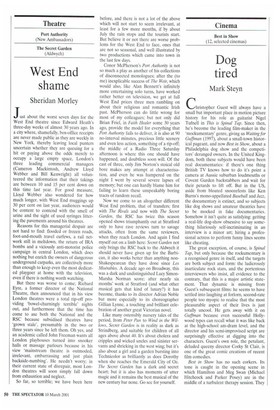Theatre
Port Authority (New Ambassadors) The Secret Garden (Aldwych)
West End shame
Sheridan Morley
Just about the worst seven days for the West End theatre since Edward Heath's three-day weeks of almost 30 years ago. In a city where, shamefully, box-office receipts are never made public as they are weekly in New York, thereby leaving local punters uncertain whether they are queuing for a hit or paying above the odds merely to occupy a large empty space, London's three leading commercial managers (Cameron Mackintosh, Andrew Lloyd Webber and Bill Kenwright) all volunteered the information that their takings are between 10 and 15 per cent down on this time last year. For good measure, Lloyd Webber also wondered for how much longer, with West End muggings up 30 per cent on last year, audiences would be content to contend with the smell of urine and the sight of used syringes littering the pavements around his theatres.
Reasons for this managerial despair are not hard to find: flooded or frozen roads, foot-and-mouth travel curfews, a rail network still in meltdown, the return of IRA bombs and a viciously anti-motorist police campaign in central London, which does nothing but enrich the owners of dangerous underground carparks, are collectively more than enough to keep even the most dedicated playgoer at home with the television, even if there is nothing worth watching.
But there was worse to come; Richard Eyre, a former director of the National Theatre, then announced that in his view London theatres were a total rip-off providing 'bowel-churningly terrible' nights out, and furthermore that the time has come to axe both the National and the RSC because subsidised theatres have 'grown stale', presumably in the two or three years since he left them. Oh yes, and an academic called John Freeman wants all London playhouses turned into snooker halls or massage parlours because in his view 'mainstream theatre is outmoded, irrelevant, embarrassing and just plain backside-numbing'. He needn't worry; in their current state of disrepair, most London theatres will soon simply fall down from exhaustion and neglect.
So far, so terrible; we have been here before, and there is not a lot of the above which will not start to seem irrelevant, at least for a few more months, if by about July the rain stops and the tourists start. But believe it or not there are worse problems for the West End to face, ones that are not so seasonal, and well illustrated by two productions which came into town in the last few days.
Conor McPherson's Port Authority is not so much a play as another of his collections of disconnected monologues; after the (to me) inexplicable success of The Weir, which would also, like Alan Bennett's infinitely more entertaining solo turns, have worked rather better on television, we get at full West End prices three men rambling on about their religious and romantic Irish past. McPherson can do little wrong for most of my colleagues; but not only did Brian Friel, in Faith Healer some 30 years ago, provide the model for everything that Port Authority fails to deliver, it is also at 90 no-interval minutes, precious little scenery and even less action, something of a rip-off; the middle of a Radio Three Saturday afternoon is where this one should have happened, and doubtless soon will. Of the cast of three, only Jim Norton's stoical old bore makes any attempt at characterisation, and even he was hampered on the night I went by several severe lapses of memory; but one can hardly blame him for failing to learn these unspeakably boring tracts of random recall.
Now we come to an altogether different West End problem, that of transfers; first with The Rivals and now with The Secret Garden, the RSC has twice this season opened shows triumphantly out at Stratford only to have rave reviews turn to savage attacks, often from the same reviewers, when they reach London. And again I find myself out on a limb here: Secret Garden not only brings the RSC back to the Aldwych it should never have given up for the Barbican, it also works better than anything nonShakespearean they have done since Les Miserables. A decade ago on Broadway, this was a dark and undistinguished Lucy SimonMarsha Norman score; after nearly six months' work at Stratford (and what other musical gets that kind of luxury?) it has become, thanks to its director Adrian Noble but more especially to its choreographer Gillian Lynne, a touching and brilliant celebration of another great Victorian novel.
Like many ostensibly nursery tales of the period, from Peter Pan to Wind in the Willows, Secret Garden is in reality as dark as Strindberg, and suitable for children of all ages above about 40. It's about cholera and cripples and wicked uncles and sinister servants and shrieking in the west wing; but it's also about a girl and a garden bursting into Technicolor as brilliantly as does Dorothy when she reaches the Emerald City of Oz. The Secret Garden has a dark and secret heart; but it is also has moments of utter magic and it remains the best musical of the new century bar none. Go see for yourself.


































































 Previous page
Previous page